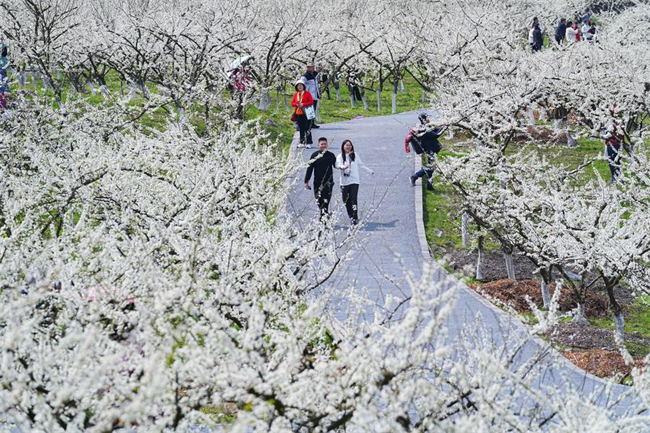According to data from the Ministry of Culture and Tourism, China recorded 1.79 billion domestic trips in the first quarter of 2025. Among them, rural residents made 476 million trips, a 39.2 percent year-on-year increase. Their total spending reached 320 billion yuan (about $44.55 billion), up 39.6 percent, outpacing the growth rates of urban travelers in both categories.
Nowadays, an increasing number of rural residents are making travel a part of their everyday lives. This growing enthusiasm is not only enriching their lifestyles but also injecting fresh momentum into the cultural and tourism industries.

Tourists enjoy spring scenery in Zhonghua Village, Beibei District, southwest China's Chongqing, March 19, 2025. (Photo by Qin Tingfu/Xinhua)
Tu Zhongxiang, a villager from Baihe village in Xuyi county, Huai'an city, east China's Jiangsu Province, recently took a family vacation to Nanjing, the provincial capital of Jiangsu. The trip cost over 10,000 yuan for four people and lasted several days.
At 56, Tu is a major grape grower with more than 50 mu (about 3.33 hectares) of vineyard and 400 mu of wheat and rice fields.
"Early May is usually peak season for thinning grape clusters and I used to be too busy to even think about traveling," she said. According to her, it was all manual work in the past. Now, with an electric tool, one sweep leaves behind perfect bunches. Thanks to mechanization, the labor required has dropped to just one-tenth of what it used to be.
Modern farming technology has made it possible for growers like Tu to enjoy occasional downtime. Her vineyard uses a water-fertilizer integration system for precision irrigation. In the wheat and rice fields, machines like rotary tillers, rice transplanters, and drones handle everything from seedling cultivation to harvesting, cutting labor costs and saving time.
E-commerce has unlocked new sales channels for Tu. On Douyin, China's popular short-video platform, she hosts livestreams to sell her grapes. "I used to take them to the local market, and now they go straight from the vineyard to customers all over the country," she said with a smile.
Tu nets 700,000 yuan a year from growing grapes, wheat, and rice, in addition to receiving subsidies for crops and agricultural machinery.
Now with more money and time, Tu travels every year. She's already visited Beijing, Shanghai, Yunnan Province in southwest China, and Anhui Province in east China.
Cui Suixiang, 63, a mason from Midong village, Mishan town, Gaoping city, a county-level city administered by Jincheng city in north China's Shanxi Province, has become a travel enthusiast. He follows travel vloggers and even creates his own travel videos.
Just a few days ago, Cui and some friends took the earliest intercity bus to Wangmangling Scenic Area in Lingchuan county, Jincheng city. "We can ride to Gaoping's transport hub for free, then transfer to other destinations for just 1 yuan. It's so convenient!" he said.
In counties of Jincheng city, affordable bus routes have formed a well-connected network linking towns, counties, scenic spots, and even cities like Zhengzhou and Jiaozuo in central China's Henan Province. This has made travel much easier for rural residents.
Wang Yanqiong and her husband, villagers from Xinliu village, Donghua town, Chuxiong city, Chuxiong Yi Autonomous Prefecture, Yunnan, have also joined the rural travel craze.
Whether it's splashing in water at the Lufeng Dinosaur Valley, smelling flowers at Yiren Ancient Town, or picking cherries on Zixi Mountain, Wang and her husband frequently take their two kids on weekend road trips around Chuxiong Yi Autonomous Prefecture.
At Dinosaur Valley, they enjoyed a float parade and lifelike dinosaur mascots. "The kids were thrilled to see 'giant dinosaurs.' We even bought dinosaur ice cream and puzzles!" Wang said.
To her surprise, county-level tourism has gotten much more exciting. At the flower hall in Yiren Ancient Town, a dazzling array of flowers fills the space. "It's prettier and more unique than before, full of Yunnan flavor."
Li Baowei, deputy director of the prefecture's Culture and Tourism Bureau, said more rural residents are choosing to travel locally, boosting the tourism market and driving ongoing upgrades in infrastructure and services.
Source: People's Daily Online








